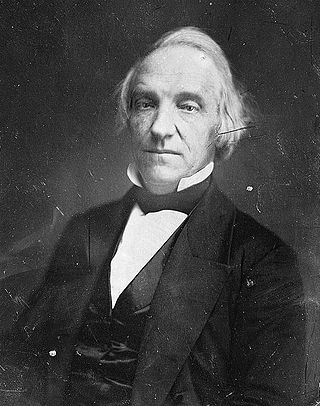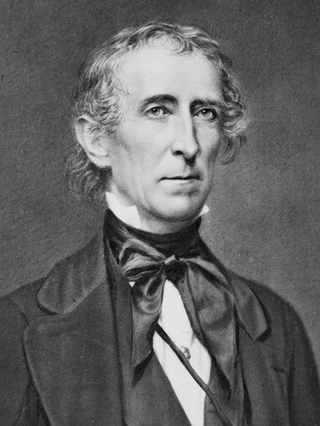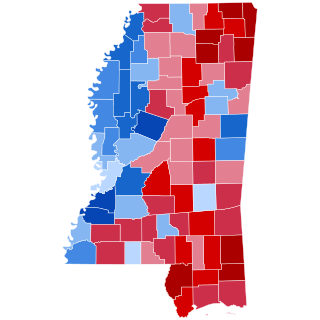
The 1824 United States presidential election was the tenth quadrennial presidential election. It was held from Tuesday, October 26 to Thursday, December 2, 1824. Andrew Jackson, John Quincy Adams, Henry Clay and William Crawford were the primary contenders for the presidency. The result of the election was inconclusive, as no candidate won a majority of the electoral vote. In the election for vice president, John C. Calhoun was elected with a comfortable majority of the vote. Because none of the candidates for president garnered an electoral vote majority, the U.S. House of Representatives, under the provisions of the Twelfth Amendment, held a contingent election. On February 9, 1825, the House voted to elect John Quincy Adams as president.

The 1828 United States presidential election was the 11th quadrennial presidential election. It was held from Friday, October 31 to Tuesday, December 2, 1828. It featured a repetition of the 1824 election, as President John Quincy Adams of the National Republican Party faced Andrew Jackson of the Democratic Party. Both parties were new organizations, and this was the first presidential election their nominees contested. This election saw the second rematch in presidential history, something that would not occur again until 1840.

The 1832 United States presidential election was the 12th quadrennial presidential election, held from November 2 to December 5, 1832. Incumbent president Andrew Jackson, candidate of the Democratic Party, defeated Henry Clay, candidate of the National Republican Party.

The 1984 United States presidential election was the 50th quadrennial presidential election held on Tuesday, November 6, 1984. Incumbent Republican president Ronald Reagan defeated Democratic former vice president Walter Mondale in a landslide victory.

The speaker of the United States House of Representatives, commonly known as the speaker of the House, is the presiding officer of the United States House of Representatives. The office was established in 1789 by Article I, Section 2 of the U.S. Constitution. The speaker is the political and parliamentary leader of the House and is simultaneously its presiding officer, de facto leader of the body's majority party, and the institution's administrative head. Speakers also perform various other administrative and procedural functions. Given these several roles and responsibilities, the speaker usually does not personally preside over debates—that duty is instead delegated to members of the House from the majority party—nor regularly participate in floor debates.

The United States Electoral College is the group of presidential electors required by the Constitution to form every four years for the sole purpose of appointing the president and vice president. Each state and the District of Columbia appoints electors pursuant to the methods described by its legislature, equal in number to its congressional delegation. Federal office holders, including senators and representatives, cannot be electors. Of the current 538 electors, an absolute majority of 270 or more electoral votes is required to elect the president and vice president. If no candidate achieves an absolute majority there, a contingent election is held by the House of Representatives to elect the president and by the Senate to elect the vice president.

Richard Mentor Johnson was an American lawyer, military officer and politician who served as the ninth vice president of the United States, serving from 1837 to 1841 under President Martin Van Buren. He is the only vice president elected by the United States Senate under the provisions of the Twelfth Amendment. Johnson also represented Kentucky in the U.S. House of Representatives and Senate. He began and ended his political career in the Kentucky House of Representatives.

Thomas Hart Benton, nicknamed "Old Bullion", was a United States Senator from Missouri. A member of the Democratic Party, he was an architect and champion of westward expansion by the United States, a cause that became known as Manifest Destiny. Benton served in the Senate from 1821 to 1851, becoming the first member of that body to serve five terms.

The Territory of Kansas was an organized incorporated territory of the United States that existed from May 30, 1854, until January 29, 1861, when the eastern portion of the territory was admitted to the Union as the free state of Kansas.

Sheila Jackson Lee is an American lawyer and politician who is the U.S. representative for Texas's 18th congressional district, having served since 1995. The district includes most of central Houston. She is a member of the Democratic Party, and served as an at-large member of the Houston City Council before being elected to the House.

Daniel Stevens Dickinson was an American politician and lawyer, most notable as a United States senator from 1844 to 1851.
In the politics of the United States, party switching is any change in party affiliation of a partisan public figure, usually one who is currently holding elected office. Use of the term "party switch" can also connote a transfer of holding power in an elected governmental body from one party to another.

Thomas James Walsh was an American lawyer and Democratic Party politician from Helena, Montana who represented Montana in the US Senate from 1913 to 1933. He was initially elected by the state legislature, and from 1918 on by popular vote, in keeping with the requirements of the Seventeenth Amendment to the United States Constitution.

The Democratic Party is one of two major contemporary political parties in the United States. Founded in 1828, it was predominantly built by Martin Van Buren, who assembled politicians in every state behind war hero Andrew Jackson, making it the world's oldest active political party. The party is a big tent of competing and often opposing viewpoints, but modern American liberalism, a variant of social liberalism, is the party's majority ideology. The party also has notable centrist and social democratic factions. Its main political rival has been the Republican Party since the 1850s.

John Tyler was the tenth president of the United States, serving from 1841 to 1845, after briefly holding office as the tenth vice president in 1841. He was elected vice president on the 1840 Whig ticket with President William Henry Harrison, succeeding to the presidency following Harrison's death 31 days after assuming office. Tyler was a stalwart supporter and advocate of states' rights, including regarding slavery, and he adopted nationalistic policies as president only when they did not infringe on the states' powers. His unexpected rise to the presidency posed a threat to the presidential ambitions of Henry Clay and other Whig politicians and left Tyler estranged from both of the nation's major political parties at the time.

Elections in Vermont are authorized under Chapter II of the Vermont State Constitution, articles 43–49, which establishes elections for the state level officers, cabinet, and legislature. Articles 50–53 establish the election of county-level officers.
The Catholic Church and abortion in the United States deals with the views and activities of the Catholic Church in the United States in relation to the abortion debate. The Catholic Church opposes abortion and has campaigned against abortion in the United States, both saying that it is immoral and making statements and taking actions in opposition to its classification as legal.

The 1968 United States presidential election in Missouri took place on November 5, 1968. All 50 states and the District of Columbia were part of the 1968 United States presidential election. Voters chose 12 electors to the Electoral College, which selected the president and vice president.

The 2020 United States presidential election in Mississippi was held on Tuesday, November 3, 2020, as part of the 2020 United States presidential election in which all 50 states plus the District of Columbia participated. Mississippi voters chose electors to represent them in the Electoral College via a popular vote, pitting the Republican Party's nominee, incumbent President Donald Trump, and running mate Vice President Mike Pence against Democratic Party nominee, former Vice President Joe Biden, and his running mate California Senator Kamala Harris. Mississippi has six electoral votes in the Electoral College.

A special election was held on September 10, 2019 to fill the vacancy in North Carolina's 3rd congressional district in the United States House of Representatives for the remainder of the 116th United States Congress. Walter B. Jones Jr., the incumbent representative, died on February 10, 2019.


















